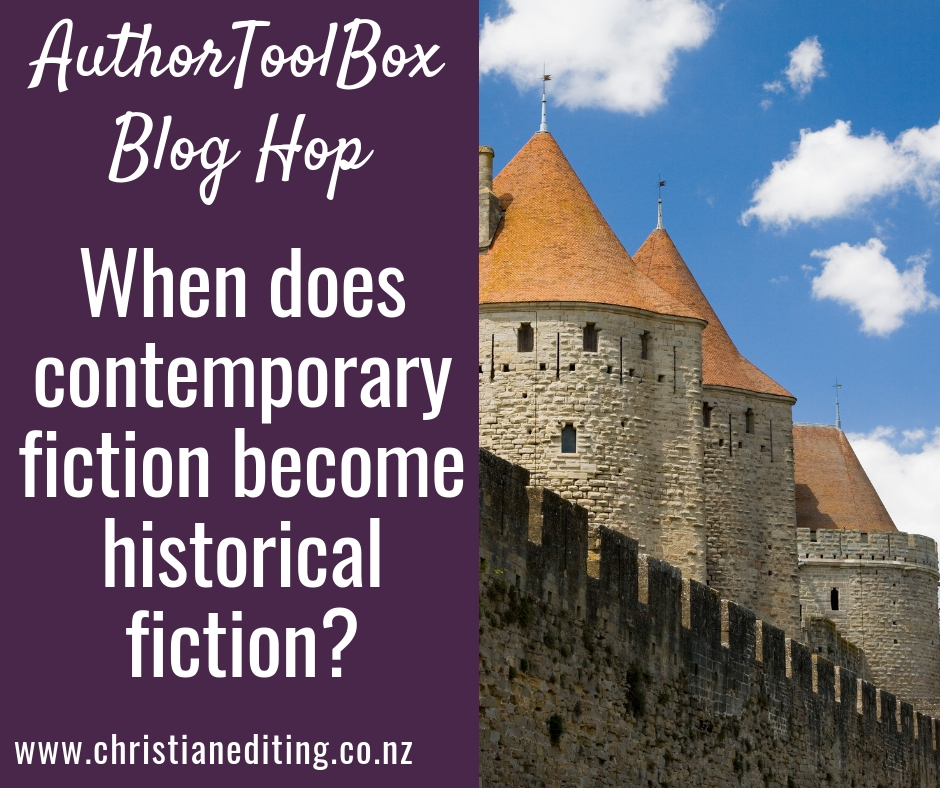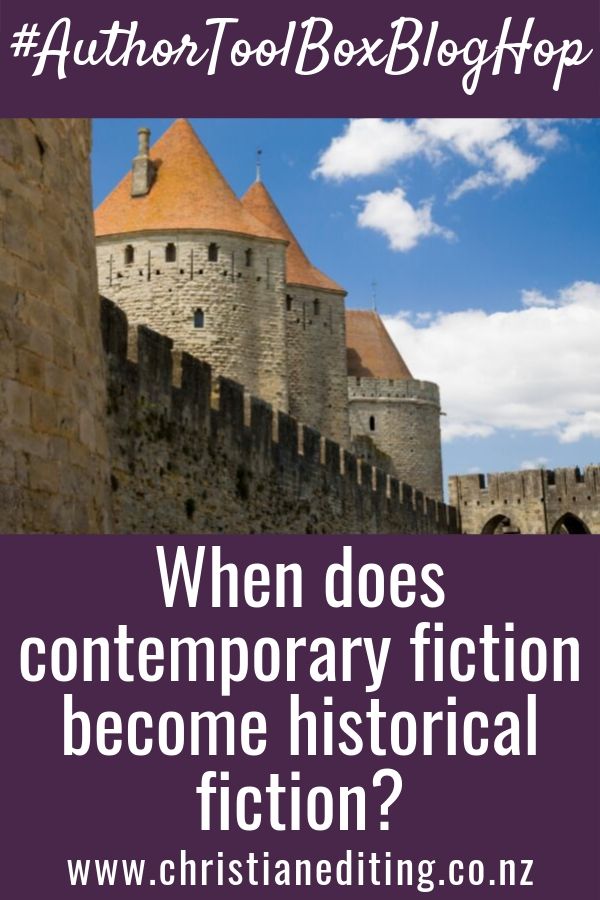This post is part of the monthly Author ToolBox Blog Hop, organised by Raimey Gallant.
We now have over 40 blogs participating. To find more Blog Hop posts:
This question came up in a Facebook group recently. How do we classify historical vs contemporary fiction? Is a novel set in 1979 historical fiction? Or contemporary fiction? That got me thinking … and searching.
When do you think a contemporary novel becomes historical fiction (or vice versa)? Who decides? #WritersLife #AuthorToolBoxBlogHop Share on XWho gets to decide whether a novel is historical or contemporary fiction? It could be:
- Libraries (if they classify by genre)
- Bookstores (who usually classify by genre)
- Writing organisations (especially those with genre-based contests)
- Authors (especially when they’re self-publishing)
- Readers
Most libraries I’ve visited organise fiction by author surname, not by genre, so that’s no help.
Bookstores often classify by genre.
But each store has different classifications, and it’s not always easy to tell what’s what. It doesn’t help that bigger stores usually classify a Christian historical romance as Religious rather than Historical (and if a book featured an African-American character or was written by an African-American author, it might be classified as African-American fiction, not Religious or Historical).
I checked Amazon, but couldn’t find any definition of historical.
That’s not to say it doesn’t exist. I just says I couldn’t find it. If you know where Amazon has a definition of contemporary vs. historical, please add it in the comments!
Amazon use the BISAC (Book Industry Standards and Communications) codes, and I couldn’t find any definition of historical on their site either.
Amazon also isn’t helpful in that publishers self-classify—which is how we find novels in the nonfiction categories, and The Tattooist of Auschwitz in the Australia and Oceania category. (I can only assume someone mixed up Austria and Australia …)
How do writing organisations classify historical vs contemporary fiction?
American Christian Fiction Writers have Contemporary and Historical categories in their Genesis and Carol Awards. They define Historical as “up to and including the Vietnam era”. The Vietnam war ended in 1975, so I guess that’s ACFW’s current definition of “historical”.
In contrast, the Romance Writers of America RITA Award and Romance Writers of Australia Ruby Award both classify “historical” as set before 1950. If you’d asked me, I think this is what I would have said—but I’m equally happy with a 1975 or even 1980 date.
With more recent historical fiction, I expect the time setting to be deliberate. For example, Pamela Binnings Ewen has written several legal thrillers set in the late 1970s and early 1980s. She’s writing about things like women’s rights and women in the workplace, so the time setting is important. They would be different stories if they were set in the 1990s or 2010s—no matter whether the stories were labelled “historical” or “contemporary”.
In general, I expect contemporary stories to be set today—this year (or last year).
I expect characters in contemporary novels to have smartphones and Facebook and GPS and the Uber app (unless they’re philosophically opposed to smartphones and Facebook and GPS and Uber … which could make for a fascinating story).
If the novel is “contemporary” and doesn’t have these things, then I need to be clued in pretty quickly that the novel isn’t set today.
When does historical fiction become contemporary fiction? Is there a fixed date? Or is it up to the publisher (or reader)? #HistoricalFiction #ContemporaryFiction Share on XI’ve recently reviewed West of Famous by Joni M Fisher, which was set in 2010. That worked for the story, but also worked because the opening made it clear the story was set in 2010. (And yes, there were a couple of plot points that wouldn’t have worked as well in 2019). In that respect, the story was actually historical … even though 2010 is hardly a long time ago.
But what about a story written and published in 2010 that I’m only reading today? Personally, I say that’s a contemporary story. Why? Because it was contemporary when it was written and published.
Using that same logic, Jane Austen was a contemporary novelist, because she was writing about the issues of her day. So were Charles Dickens and Agatha Christie.
So I consider a contemporary story as one that is written and published in the time in which it is set (whether that’s today or two hundred years ago). And a historical story is any story where the author is consciously looking back in time by at least a couple of decades.
What about you? When do you think historical fiction becomes contemporary fiction (Or vice versa)?



I am surprised Amazon doesn’t have a definition for historical and contemporary. I like all the points you bring up 🙂
That surprised me as well. It seems like a gap. Thanks for visiting 🙂
Although I write historical fiction, I’ve never really thought about it. I think the latest anything I’ve written has been 1940s – and that was at the end. But I like your definitions. I was on the fence about Dickens etc., but you do make sense. I never think of those as historical or contemporary – just classics.
Yes, Austen and Dickens (love them or loathe them) are definitely classics. Thanks for visiting.
I’ve been going through the blog hop, and I’m enjoying the articles I’ve read so far. I really liked your post on contemporary and historical. TY for sharing.
Thanks for stopping by, Maggie. Glad you’re enjoying the blog hop.
I’ve never thought about it and like your take on it.
I’ve noticed this in movies—like the Body Snatchers and The Thing. They get reinvented again and again. It shows us how much things have changed and stayed the same.
Anna from elements of emaginette
My favourite Bodysnatchers movie was always the original … until I realised I was talking about the Leonard Nimoy/Jeff Goldblum version, which is a remake 🙂
I suspect these movies work again and again because while technology might have changed the world around us, the essence of human nature hasn’t changed, and nor has the essence of a good story. So they can be made again and again, updated for a new generation.
However, The Princess Bride is perfect and does not need to be remade.
I agree with you. If it wasn’t this year or last, it’s historical. Technology changes so much that even five years ago, things were different.
Susan Says
I know! It’s less than five years since I got my first smartphone, and less than ten years since I’ve been on social media. Both of those things have changed my everyday life (not necessarily for the better, but that’s a different question). Life without instant internet access certainly feels historical, no matter what the official definitions!
I’ve been so excited to read this post ever since I saw it on Twitter. It’s been a burning question for me! I was so curious about The Tattoist of Auschwitz classification, so I went and looked up the author. She’s a resident of Australia, but how clever to make the Austria connection! It totally could have been a typo. Oooo, I hadn’t thought about the contemporary if it’s set in the time it is written argument. In the past year or so, I’ve heard authors refer to books set in the 1990s as “period,” and I kind of agree with that, even though it ages me, because I’m an 80s/90s kid.
I’ve only heard “period” used to refer to BBC TV series e.g. Pride and Prejudice or Downton Abbey, so I’d be taken aback if I heard the 80s or 90s be referred to as ‘period”. On the other hand, they’re not yet historical, so it is a useful inbetween term.
Such a great question, Iola. I would say historical was anything from 1950 and earlier. I’d hate to think of my college memoir as historical because I graduated in 2009. Interesting post. Thanks for sharing your insight with our Author Toolbox followers. All best to you!
I suspect memoir is a little different to fiction in this context, as you can’t move the timeline. But it is kind of sobering to think of our own lives as future history!